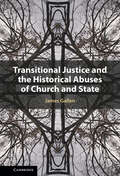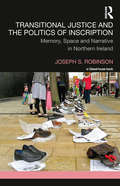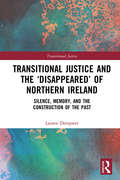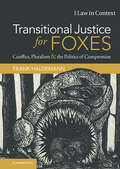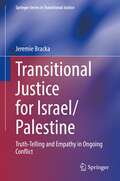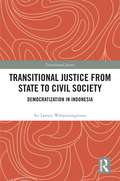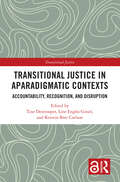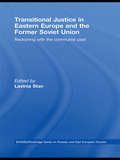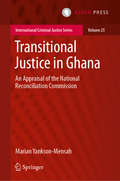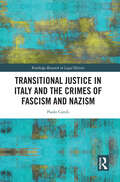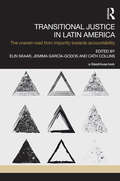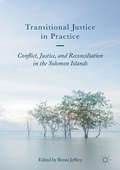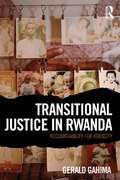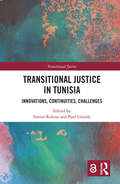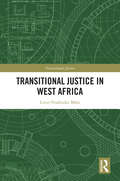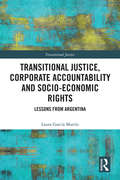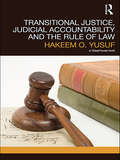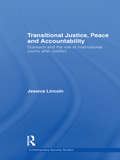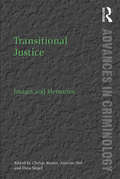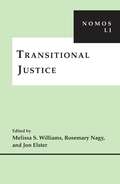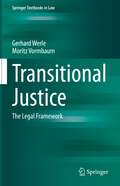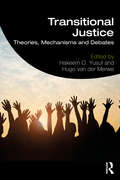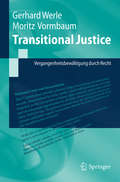- Table View
- List View
Transitional Justice and the Historical Abuses of Church and State
by James GallenIn this book, James Gallen provides an in-depth evaluation of the responses of Western States and churches to their historical abuses from a transitional justice perspective. Using a comparative lens, this book examines the application of transitional justice to address and redress the past in Ireland, Australia, Canada, the United States and United Kingdom. It evaluates the use of public inquiries and truth commissions, litigation, reparations, apologies, and reconciliation in each context to address these abuses. Significantly, this novel analysis considers how power and public emotions influence, and often impede, transitional justice's ability to address historical-structural injustices. In addressing historical abuses, power fails to be redistributed and national and religious myths are not reconsidered, leading Gallen to conclude that the existing transitional justice efforts of states and churches remain an unrepentant form of justice. This title is also available as Open Access on Cambridge Core.
Transitional Justice and the Politics of Inscription: Memory, Space and Narrative in Northern Ireland
by Joseph RobinsonTaking Northern Ireland as its primary case study, this book applies the burgeoning literature in memory studies to the primary question of transitional justice: how shall societies and individuals reckon with a traumatic past? Joseph Robinson argues that without understanding how memory shapes, moulds, and frames narratives of the past in the minds of communities and individuals, theorists and practitioners may not be able to fully appreciate the complex, emotive realities of transitional political landscapes. Drawing on interviews with what the author terms "memory curators," coupled with a robust analysis of secondary literature from a range of transitional cases, the book analyses how the bodies of the dead, the injured, and the traumatised are written into - or written out of - transitional justice. The author argues that scholars cannot appreciate the dynamism of transitional memory-space unless they first engage with the often silenced or marginalised voices whose memories remain trapped behind the antagonistic politics of fear and division. Ultimately challenging the imperative of national reconciliation, the author argues for a politics of public memory that incubates at multiple nodes of social production and can facilitate a vibrant, democratic debate over the ways in which a traumatic past can or should be remembered.
Transitional Justice and the ‘Disappeared’ of Northern Ireland: Silence, Memory, and the Construction of the Past
by Lauren DempsterThis book employs a transitional justice lens to address the ‘disappearances’ that occurred during the Northern Ireland conflict – or ‘Troubles’ – and the post-conflict response to these ‘disappearances.’ Despite an extensive literature around ‘dealing with the past’ in Northern Ireland, as well as a substantial body of scholarship on ‘disappearances’ in other national contexts, there has been little scholarly scrutiny of ‘disappearances’ in post-conflict Northern Ireland. Although the Good Friday Agreement brought relative peace to Northern Ireland, no provision was made for the establishment of some form of overarching truth and reconciliation commission aimed at comprehensively addressing the legacy of violence. Nevertheless, a mechanism to recover the remains of the ‘disappeared’ – the Independent Commission for the Location of Victims’ Remains (ICLVR) – was established, and has in fact proven to be quite effective. As a result, the reactions of key constituencies to the ‘disappearances’ can be used as a prism through which to comprehensively explore issues of relevance to transitional justice scholars and practitioners. Pursuing an interdisciplinary approach, and based on extensive empirical research, this book provides a multifaceted exploration of the responses of these constituencies to the practice of ‘disappearing.’ It engages with transitional justice themes including silence, memory, truth, acknowledgement, and apology. Key issues examined include the mobilisation efforts of families of the ‘disappeared,’ efforts by a (former) non-state armed group to address its legacy of violence, the utility of a limited immunity mechanism to incentivise information provision, and the interplay between silence and memory in the shaping of a collective, societal understanding of the ‘disappeared.’
Transitional Justice for Foxes: Conflict, Pluralism and the Politics of Compromise (Law in Context)
by Frank HaldemannThere is a memorable line by ancient Greek poet Archilochus: 'The fox knows many things, but the hedgehog knows one big thing.' Drawing on this metaphor made popular by Isaiah Berlin, this book sets out to 'think like a fox' about transitional justice in an intellectual environment largely dominated by hedgehogs. Critical of the unitary 'hedgehog-like' vision underlying mainstream discourse, this book proposes a pluralist reading of the field. It asks: What would it mean for transitional justice to constructively deal with conflicts of values and interests in societies grappling with a violent past? And what would it imply to make meaningful room for diversity, to see 'the many' rather than just 'the one'?
Transitional Justice for Israel/Palestine: Truth-Telling and Empathy in Ongoing Conflict (Springer Series in Transitional Justice)
by Jeremie BrackaThis book applies the dynamic field of transitional justice to conflict resolution in Israel/Palestine. Around the globe, diverse societies have pursued truth-telling, restorative justice and reconciliation to end conflict -- yet the language of transitional justice has been all but absent in Israel/Palestine. This volume squarely addresses how transitional justice could contribute to conflict transformation and accountability, incorporating the questions of collective justice, memory, and human rights. It covers the most important historical and legal issues facing Israel/Palestine with a focus on civil societies in South Africa, Northern Ireland and Latin America. Ultimately, the book proposes an unofficial Israeli-Palestinian Truth and Empathy Commission (IPTEC) to address gross human rights abuses committed by both nations.Transitional Justice for Israel/Palestine will be of interest to researchers, NGOs, and policy makers working in transitional justice and societies with ongoing conflict.
Transitional Justice from State to Civil Society: Democratization in Indonesia
by Sri Lestari WahyuningroemThis book is the first to offer an in-depth analysis of transitional justice as an unfinished agenda in Indonesia’s democracy. Examining the implementation of transitional justice measures in post-authoritarian Indonesia, this book analyses the factors within the democratic transition that either facilitated or hindered the adoption and implementation of transitional justice measures. Furthermore, it contributes key insights from an extensive examination of ‘bottom-up’ approaches to transitional justice in Indonesia: through a range of case studies, civil society-led initiatives to truth-seeking and local reconciliation efforts. Based on extensive archival, legal and media research, as well as interviews with key actors in Indonesia’s democracy and human rights’ institutions, the book provides a significant contribution to current understandings of Indonesia’s democracy. Its analysis of the failure of state-centred transitional justice measures, and the role of civil society, also makes an important addition to comparative transitional justice studies. It will be of considerable interest to scholars and activists in the fields of Transitional Justice and Politics, as well as in Asian Studies.
Transitional Justice in Aparadigmatic Contexts: Accountability, Recognition, and Disruption
by Tine Destrooper, Line Engbo Gissel, and Kerstin Bree CarlsonThis book explores the practical and theoretical opportunities as well as the challenges raised by the expansion of transitional justice into new and ‘aparadigmatic’ cases. The book defines transitional justice as the pursuit of accountability, recognition and/or disruption and applies an actor-centric analysis focusing on justice actors’ intentions of and responses to transitional justice. It offers a typology of different transitional justice contexts ranging from societies experiencing ongoing conflict to consolidated democracies, and includes chapters from all types of aparadigmatic contexts. This covers transitional justice in states with contested political authority, shared political authority, and consolidated political authority. The transitional justice initiatives explored by the wide range of contributors are those of Afghanistan, Belgium, France, Greenland/Denmark, Libya, Syria, Turkey/Kurdistan, UK/Iraq, US, and Yemen. Through these aparadigmatic case studies, the book develops a new framework that, appropriate to its expanding reach, allows us to understand the practice of transitional justice in a more context-sensitive, bottom-up, and actor-oriented way, which leaves room for the complexity and messiness of interventions on the ground. The book will appeal to scholars and practitioners in the broad field of transitional justice, as represented in law, criminology, politics, conflict studies and human rights.
Transitional Justice in Eastern Europe and the former Soviet Union: Reckoning with the Communist Past (BASEES/Routledge Series on Russian and East European Studies)
by Lavinia StanDuring the last two decades, the countries of Eastern Europe and the former Soviet Union have attempted to address the numerous human rights abuses that characterized the decades of communist rule. This book examines the main processes of transitional justice that permitted societies in those countries to come to terms with their recent past. It explores lustration, the banning of communist officials and secret political police officers and informers from post-communist politic, ordinary citizens’ access to the remaining archives compiled on them by the communist secret police, as well as trials and court proceedings launched against former communist officials and secret agents for their human rights trespasses. Individual chapters explore the progress of transitional justice in Germany, the Czech Republic, Slovakia, Poland, Hungary, Romania, Bulgaria, Albania, Slovenia and the successor states of the former Soviet Union. The chapters explain why different countries have employed different models to come to terms with their communist past; assess each country’s relative successes and failures; and probe the efficacy of country-specific legislation to attain the transitional justice goals for which it was developed. The book draws together the country cases into a comprehensive comparative analysis of the determinants of post-communist transitional justice, that will be relevant not only to scholars of post-communist transition, but also to anyone interested in transitional justice in other contexts.
Transitional Justice in Ghana: An Appraisal of the National Reconciliation Commission (International Criminal Justice Series #25)
by Marian Yankson-MensahThis book situates Ghana's truth-telling process, which took place from 2002 to 2004, within the discourse on the effectiveness of the different mechanisms used by post-conflict and post-dictatorship societies to address gross human rights violations. The National Reconciliation Commission was the most comprehensive transitional justice mechanism employed during Ghana's transitional process in addition to amnesties, reparations and minimal institutional reforms. Due to a blanket amnesty that derailed all prospects of resorting to judicial mechanisms to address gross human rights violations, the commission was established as an alternative to prosecutions. Against this background, the author undertakes a holistic assessment of the National Reconciliation Commission's features, mandate, procedure and aftermath to ascertain the loopholes in Ghana's transitional process. She defines criteria for the assessment, which can be utilised with some modifications to assess the impact of other transitional justice mechanisms. Furthermore, she also reflects on the options and possible setbacks for future attempts to address the gaps in the mechanisms utilised. With a detailed account of the human rights violations perpetrated in Ghana from 1957 to 1993, this volume of the International Criminal Justice Series provides a useful insight into the factors that shape the outcomes of transitional justice processes. Given its combination of normative, comparative and empirical approaches, the book will be useful to academics, students, practitioners and policy makers by fostering their understanding of the implications of the different features of truth commissions, the methods for assessing transitional justice mechanisms, and the different factors to consider when designing mechanisms to address gross human rights violations in the aftermath of a conflict or dictatorship. Marian Yankson-Mensah is a Researcher and Project Officer at the International Nuremberg Principles Academy in Nuremberg, Germany.
Transitional Justice in Italy and the Crimes of Fascism and Nazism (Routledge Research in Legal History)
by Paolo CaroliThis book presents a comprehensive analysis of the Italian experience of transitional justice examining how the crimes of Fascism and World War II have been dealt with from a comparative perspective. Applying an interdisciplinary and comparative methodology, the book offers a detailed reconstruction of the prosecution of the crimes of Fascism and the Italian Social Republic as well as crimes committed by Nazi soldiers against Italian civilians and those of the Italian army against foreign populations. It also explores the legal qualification and prosecution of the actions of the Resistance. Particular focus is given to the Togliatti Amnesty, the major turning point, through comparisons to the wider European post-WWII transitional scenario and other relevant transitional amnesties, allowing consideration of the intense debate on the legitimacy of amnesties under international law. The book evaluates the Italian experience and provides an ideal framework to assess the complexity of the interdependencies between time, historical memory and the use of criminal law. In a historical moment marked by the resurgence of racism, neo-fascism, falsifications of the past, as well as the desire to amend the faults of the past, the Italian unfinished experience of dealing with the Fascist era can help move the discussion forward. The book will be essential reading for students, researchers and academics in International Criminal Law, Transitional Justice, History, Memory Studies and Political Science.
Transitional Justice in Latin America: The Uneven Road from Impunity towards Accountability
by Elin Skaar Cath Collins Jemima Garcia-GodosThis book addresses current developments in transitional justice in Latin America – effectively the first region to undergo concentrated transitional justice experiences in modern times. Using a comparative approach, it examines trajectories in truth, justice, reparations, and amnesties in countries emerging from periods of massive violations of human rights and humanitarian law. The book examines the cases of Argentina, Brazil, Chile, Colombia, Guatemala, El Salvador, Paraguay, Peru and Uruguay, developing and applying a common analytical framework to provide a systematic, qualitative and comparative analysis of their transitional justice experiences. More specifically, the book investigates to what extent there has been a shift from impunity towards accountability for past human rights violations in Latin America. Using ‘thick’, but structured, narratives – which allow patterns to emerge, rather than being imposed – the book assesses how the quality, timing and sequencing of transitional justice mechanisms, along with the context in which they appear, have mattered for the nature and impact of transitional justice processes in the region. Offering a new approach to assessing transitional justice, and challenging many assumptions in the established literature, this book will be of enormous benefit to scholars and others working in this area.
Transitional Justice in Post-Communist Romania
by Lavinia Stan"A close examination of an understudied European Union member state such as Romania reveals that, since 1989, postcommunist state and non-state actors have adopted a wide range of methods, processes, and practices of working through the communist past. Both the timing and the sequencing of these transitional justice methods prove to be significant in determining the efficacy of addressing and redressing the crimes of 1945 to 1989. In addition, there is evidence that some of these methods have directly facilitated the democratization process, while the absence of other methods has undermined the rule of law. This is the first volume to overview the complex Romanian transitional justice effort, by accessing secret archives and investigating court trials of former communist perpetrators, lustration, compensation and rehabilitation, property restitution, the truth commission, the rewriting of history books, and unofficial truth projects. It details the political negotiations that have led to the adoption of relevant legislation and assesses these processes in terms of their timing, sequencing, and impact on democratization"--
Transitional Justice in Practice: Conflict, Justice, and Reconciliation in the Solomon Islands
by Renée JefferyThis book examines the practice of transitional justice in the Solomon Islands from the period of the ‘The Tensions’ to the present. In late 1998, the Solomon Islands were plunged into a period of violent civil conflict precipitated by a complex web of grievances, injustices, ethnic tensions, and economic insecurities. This conflict dragged on until the middle of 2003, leaving an estimated 200 people dead and more than 20 000 displaced from their homes. In the time that has elapsed since the end of The Tensions, numerous—at times incompatible—approaches to transitional justice have been implemented in the Solomon Islands. The contributors to this volume examine how key global trends and debates about transitional justice were played out in the Solomon Islands, how its key mechanisms were adapted to meet the specific demands of post-conflict justice in this local context, and how well its practices and processes fulfilled their perceived functions.
Transitional Justice in Rwanda: Accountability for Atrocity
by Gerald GahimaTransitional Justice in Rwanda: Accountability for Atrocity comprehensively analyzes the full range of the transitional justice processes undertaken for the Rwandan genocide. Drawing on the author’s extensive professional experience as the principal justice policy maker and the leading law enforcement officer in Rwanda from 1996-2003, the book provides an in-depth analysis of the social, political and legal challenges faced by Rwanda in the aftermath of the genocide and the aspirations and legacy of transitional justice. The book explores the role played by the accountability processes not just in pursuing accountability but also in shaping the reconstruction of Rwanda’s institutions of democratic governance and political reconciliation. Central to this exploration will be the examination of whether or not transitional justice in Rwanda has contributed to a foundational rule of law reform process. While recognizing the necessity of pursuing accountability for mass atrocity, the book argues that a maximal approach to accountability for genocide may undermine the promotion of core objectives of transitional justice. Taking on one of the key questions facing practitioners and scholars of transitional justice today, the book suggests that the pursuit of mass accountability, particularly where socio-economic resources and legal capacity is limited, may destabilize the process of rule of law reform, endangering core human rights norms. Moreover, the book suggests that pursuing a strategy of mass accountability may undermine the process of democratic transition, particularly in a context where impunity for crimes committed by the victors of armed conflicts persists. Highlighting the ongoing democratic deficit in Rwanda and resulting political instability in the Great Lakes region, the book argues that the effectiveness of transitional justice ultimately hinges on the nature and success of political transition.
Transitional Justice in Tunisia: Innovations, Continuities, Challenges
by Paul Gready Simon RobinsThis book engages comprehensively with the dynamics of the transitional justice process in Tunisia and its mechanisms, elaborating lessons for transitional justice practice globally. Grounded in new empirical material as well as a broader awareness of transitional justice, this book provides a thorough assessment of transitional justice in Tunisia. Beyond an overview of the process, it critically engages with key questions such as the extent to which the process articulated global contemporary practice, such as liberal state-building and narrow conceptions of justice as civil-political rights, and to which it generated novel approaches at odds with the mainstream that can inform global practice. The book examines how the transitional justice process in Tunisia has been contextualised and made relevant to the nation’s circumstances and needs. It looks at innovation at the level of formal mechanisms and at the dynamics of mobilisation and contestation surrounding transitional justice both from civil society organisations and victims’ groups. Bringing together analysis from legal scholars, social scientists as well as activists and practitioners, the book challenges the legalism of transitional justice discourse globally, engendering a dialogue between these legal and judicial approaches on the one hand and alternative, more diverse and radical approaches to justice on the other, in order to both deal with the past and to address ongoing injustice. This first book in English to address the dynamics and mechanisms of the transitional justice process in Tunisia will appeal to students and scholars of transitional justice, human rights, peacebuilding, conflict and peace studies, development, and security studies, as well as policymakers and practitioners in these fields, and others with interests in Middle Eastern studies.
Transitional Justice in West Africa
by Linus Nnabuike MaluThis book explores the challenges of transitional justice in West Africa, specifically how countries in the region have dealt with transitional justice problems in the last 30 years (1990–2020), and how they have managed the process. Using comparative, historical, and legal analyses it examines the politics of justice after violent conflicts in West Africa, the major transitional justice mechanisms established in the region, and how countries have used these institutions to address injustice and the pains of war in some West African countries. The book examines how transitional justice mechanisms have contributed to victims’ rights, reconciliation, and peace in transitional societies, and whether transitional justice mechanisms deployed in West Africa were suitable or ill-fitted, and the politics of deploying them. The book is addressed to a wide audience: policymakers, and graduate and post-graduate students of transitional justice, conflict resolution, peace studies, conflict transformation, international criminal law, law and similar subjects. This book will be of great value to academics and researchers, as well as lecturers in tertiary institutions offering relevant courses; legal practitioners; peace practitioners/NGOs; and those working in the field of transitional justice and human rights.
Transitional Justice in the Asia-Pacific
by Renée Jeffery Hun Joon KimHow to address the human rights violations of previous regimes and past periods of conflict is one of the most pressing questions facing governments and policy makers today. New democracies and states in the fragile post-conflict peace-settlement phase are confronted by the need to make crucial decisions about whether to hold perpetrators of human rights violations accountable for their actions and, if so, how to best achieve that end. This is the first book to examine the ways in which states and societies in the Asia-Pacific region have navigated these difficult waters. Drawing together several of the world's leading experts on transitional justice with Asia-Pacific regional and country specialists it provides an overview of the processes and practices of transitional justice in the region as well as detailed analysis of the cases of Cambodia; Sri Lanka; Aceh, Indonesia; South Korea; the Solomon Islands; and East Timor.
Transitional Justice, Corporate Accountability and Socio-Economic Rights: Lessons from Argentina
by Laura García MartínThis book explores the intersection of two emergent and vibrant fields of study in international human rights law: transitional justice and corporate accountability for human rights abuses. While both have received significant academic and political attention, the potential links between them remain largely unexplored. This book addresses the normative question of how international human rights law should deal with corporate accountability and violations of economic, social and cultural rights in transitional justice processes. Drawing on the Argentinian transitional justice process, the book outlines the theoretical and practical challenges of including corporate accountability in transitional justice processes through existing mechanisms. Offering specific insights about how to deal with those challenges, it argues that consideration of the role of all actors, and the whole spectrum of human rights violated, is crucial to properly address the root causes of violence and conflict as well as to contribute to a sustainable and positive peace. This interdisciplinary book will be of interest to students and scholars of transitional justice, human rights law, corporate law and international law.
Transitional Justice, Judicial Accountability and the Rule of Law
by Hakeem O. YusufTransitional Justice, Judicial Accountability and the Rule of Law addresses the importance of judicial accountability in transitional justice processes. Despite a general consensus that the judiciary plays an important role in contemporary governance, accountability for the judicial role in formerly authoritarian societies remains largely elided and under-researched. Hakeem O. Yusuf argues that the purview of transitional justice mechanisms should, as a matter of policy, be extended to scrutiny of the judicial role in the past. Through a critical comparative approach that cuts through the transitioning experiences of post-authoritarian and post-conflict polities in Latin America, Asia, Europe and Africa, the book focuses specifically on Nigeria. It demonstrates that public accountability of the judiciary through the mechanism of a truth-seeking process is a necessary component in securing comprehensive accountability for the judicial role in the past. Transitional Justice, Judicial Accountability and the Rule of Law further shows that an across-the-board transformation of state institutions – an important aspiration of transitional processes – is virtually impossible without incorporating the third branch of government, the judiciary, into the accountability process.
Transitional Justice, Peace and Accountability: Outreach and the Role of International Courts after Conflict (Contemporary Security Studies)
by Jessica LincolnThe book looks at the outreach and communication strategies employed by internationalised courts to try to understand the wider impact of international justice. This book critically examines the role of outreach within international justice focusing specifically on the role of outreach at the Special Court for Sierra Leone (SCSL). It contributes to understanding of the relationship between international courts and the affected populations; an area currently underexplored and little understood. The assumption that justice brings peace underpins much of the thinking, and indeed action, of international justice, yet little is known if this is actually the case. Significant questions surrounding the link between peace and justice remain: do trials deter would-be war criminals; is justice possible for the most heinous crimes; can international justice replace local justice? This book explores these questions in relation to recent developments in international justice that have both informed and shaped the creation of the hybrid tribunal in Sierra Leone. Through empirical analysis, Transitional Justice, Peace and Accountability, answers these questions and provides an insight into individual and community perceptions of international justice. This book will be of much interest to students of transitional justice, war crimes, peace and conflict studies, human rights, international law, and IR in general.
Transitional Justice: Images and Memories (New Advances in Crime and Social Harm)
by Christine BellThis collection on transitional justice sits as part of a library of essays on different concepts of ’justice’. Yet transitional justice appears quite different from other types of justice and fundamental ambiguities characterise the term that raise questions as to how it should sit alongside other concepts of justice. This collection attempts to capture and portray three different dimensions of the transitional justice field. Part I addresses the origins of the field which continue to bedevil it. Indeed the origins themselves are increasingly debated in what is an emergent contested historiography of the field that assists in understanding its contemporary quirks and concerns. Part II addresses and sets out parts of the ’tool-kit’ of transitional justice, which could be understood as the canonical research agenda of the field. Part III tries to convey a sense of the way in which the field is un-folding and extending to new transitions, tools, theories of justice, and self-critique.
Transitional Justice: NOMOS LI (NOMOS - American Society for Political and Legal Philosophy #34)
by Rosemary NagyCriminaltribunals, truth commissions, reparations, apologies and memorializations arethe characteristic instruments in the transitional justice toolkit that can helpsocieties transition from authoritarianism to democracy, from civil war topeace, and from state-sponsored extra-legal violence to a rights-respectingrule of law. Over the last several decades, their growing use has establishedtransitional justice as a body of both theory and practice whose guiding normsand structures encompasses the range of institutional mechanisms by whichsocieties address the wrongs committed by past regimes in order to lay thefoundation for more legitimate political and legal order. In TransitionalJustice, a group of leadingscholars in philosophy, law, and political science settles some of the keytheoretical debates over the meaning of transitional justice while opening upnew ones. By engaging both theorists and empirical social scientists in debatesover central categories of analysis in the study of transitional justice, italso illuminates the challenges of making strong empirical claims about theimpact of transitional institutions. Contributors:Gary J. Bass, David Cohen, David Dyzenhaus, Pablo de Greiff, Leigh-AshleyLipscomb, Monika Nalepa, Eric A. Posner, Debra Satz, GopalSreenivasan, AdrianVermeule, and Jeremy Webber.
Transitional Justice: The Legal Framework (Springer Textbooks in Law)
by Gerhard Werle Moritz VormbaumThe expression “transitional justice” emerged at the end of the Cold War, during the transition from dictatorships to democracies, and serves as a central concept in dealing with systemic injustice. This textbook examines the basic principles of transitional justice and explores its core mechanisms, including prosecutions, amnesties, truth commissions, reparations, and vetting the public service. It elaborates the substance and legal framework of these mechanisms and discusses current challenges.The book provides extensive material illustrating a wide variety of transitional justice situations. “This book summarizes the subjects of transitional justice and Vergangenheitsbewältigung systematically and clearly” (Joachim Gauck, German Federal President, 2012-2017).
Transitional Justice: Theories, Mechanisms and Debates
by Hakeem O. Yusuf and Hugo van der MerweTransitional justice is the way societies that have experienced civil conflict or authoritarian rule and widespread violations of human rights deal with the experience. With its roots in law, transitional justice as an area of study crosses various fields in the social sciences. This book is written with this multi- and inter-disciplinary dynamic of the field in mind. The book presents the broad scope of transitional justice studies through a focus on the theory, mechanisms and debates in the area, covering such topics as: The origin, context and development of transitional justice Victims, victimology and transitional justice Prosecutions for abuses and gross violations of human rights Truth commissions Transitional justice and local justice Gender, political economy and transitional justice Apology, reconciliation and the politics of memory Offering a discussion of the impact and outcomes of transitional justice, this approach provides valuable insight for those who seek both an introduction alongside relatively advanced engagement with the subject. Transitional Justice: Theories, Mechanisms and Debates is an important text for postgraduate and advanced undergraduate students who take courses in transitional justice, human rights and criminal law, as well as a systematic reference text for researchers.
Transitional Justice: Vergangenheitsbewältigung durch Recht (Springer-Lehrbuch)
by Gerhard Werle Moritz VormbaumDieses Buch bietet die erste systematische Gesamtdarstellung zum Thema Transitional Justice in deutscher Sprache. Der Ausdruck „Transitional Justice“ hat sich zum Ende des Kalten Krieges beim Übergang von Diktaturen zur Demokratie etabliert und dient als Leitbegriff zur Aufarbeitung von Systemunrecht. Das vorliegende Werk entwickelt die Grundprinzipien von Transitional Justice und behandelt die fünf wesentlichen Aufarbeitungsoptionen – Strafverfolgung, Amnestien, Wahrheitskommissionen, Wiedergutmachung sowie die Überprüfung des öffentlichen Dienstes. Aktuelle Herausforderungen werden diskutiert. Reichhaltiges Anschauungsmaterial beleuchtet über 50 Aufarbeitungssituationen. Das Buch verfolgt einen doppelten Zweck: Es soll zum einen Rechtswissenschaftlerinnen und Rechtswissenschaftlern sowie praktisch tätigen Juristinnen und Juristen den Zugang zur Materie erleichtern. Zum anderen soll es benachbarten Disziplinen einen konzentrierten Einblick in die rechtlichen Leitprinzipien von Transitional Justice ermöglichen.
